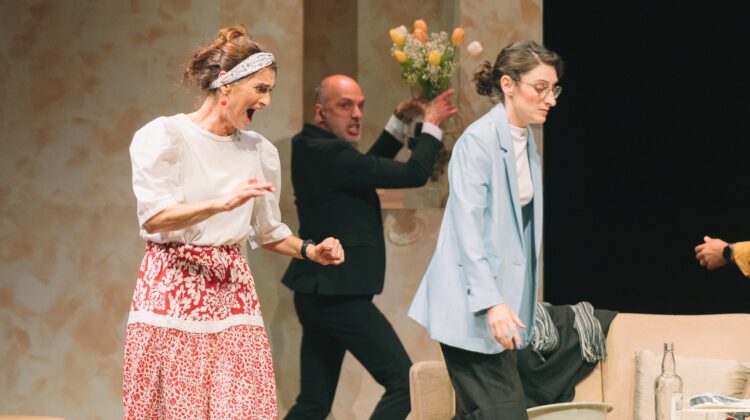
Charlotte Grech, Chris Dingli and Chiara Hyzler in God of Carnage. Photo: Nisġa
We all love a good train wreck on stage, especially the emotional kind. Yasmina Reza happens to specialise in human train wrecks, as we’ve already witness in the locally-produced version of Art. If you thought that Art was a particularly savage take on human foibles, welcome to God of Carnage. A thousand times darker, a thousand times funnier (my subjective opinion, of course).
Produced by Teatru Manoel and directed by Andre Agius, back in Malta specifically for this, this God of Carnage brought together four local heavyweights on the stage of our national theatre – Chiara Hyzler as Annette, Chris Dingli as her husband Alan, Charlotte Grech as Veronica, and Pierre Stafrace as her husband Michael.
The narrative revolves around a very basic scenraio that we’ve seen play out dozens of times across schools, playgrounds and home. Two young boys have a fight, one of them ends up the worse for wear, and the parents gets together to – ostensibly – discuss the matter in a civilised manner. In a nutshell, that’s the essence of God of Carnage. Nothing much happens from the point of view of the plot.
Well, this was one of the best ‘nothing much happens’ I have witnessed. Agius couldn’t have picked a better set of actors to land Reza’s biting dialogue ever so sharply. Dingli was in fine fettle, imbuing the original character’s obnoxious traits with his trademark physicality and facial emotiveness, taking the character’s comedic traits to the next level without losing any of the sharpness. Dingli is one of very few actors who can pull off this intentionally hammy approach without looking ridiculous.
It was good to see Hyzler on stage in such a meaty role, having recently seen her mostly in the role of director. She brings an initial iciness to the character of Annette that makes the eventual emotional breakdown even more effective. The stark contrast between the character we meet in the first half of the play to the one that closes those last, shock-imbued moments is wonderful. Her role included a very well-handled projectile vomiting scene which must have been a royal pain in terms of mechanics.
Grech’s Veronica is the very picture of prim middle-class. The only one who genuinely wants to maintain a semblance of civilisation, when she’s pushed over the edge she pulls Michael in for what must be one of the most relateable couple arguments in theatre history. The sheer ‘desperation’ of it all is tangible.
Stafrace’s Michael has some of the darkest, and most accurate (again, my purely subjective observation) lines in the whole play. And he makes them land beautifully, initially starting out as the most ‘harmless’ of the gang, the people-pleaser offering cake and rum. His pacing could’ve been brisker on occasion, but his one-liners had the entire theatre laughing nervously, which is probably the precise effect Reza was after. Stafrace’s character also take a spectacularly dark turn, one that the actor embraces masterfully, accurately reflecting a society where even the ‘nice ones’ are not immune to the intrinsic selfishness of human nature.
Reza’s script may not be as shocking as it was back when it was written in 2008, with plenty of darker material available nowadays. But it remains extremely accurate and sharp. Human nature is what it is, even though we rarely allow ourselves to acknowledge our less admirable traits out loud. And it’s exactly the unabashed portrayal of what happens when the gloves come off that makes God of Carnage so entertaining.
This deterioration of the civilised front is central to the play, and Agius nails it. His direction includes very simple staging that cleverly placed the focus entirely on the actors, amping up the physicality of their characters. The effect is of four tigers, barely restrained in a cage. The sense of unease is delicious, as is the guilty laughter that punctuates the entire production.
Affiliate/Advertising Disclaimer: How I Carry Out Reviews
I received no payment for this review and I used press review tickets. The opinions expressed here are purely my own and Teatru Manoel had no input/control over what I wrote. No affiliate links are included in this review.To learn more about my policies and my reviewing process, visit my Affiliate/Advertising disclosure page.
